Tutoroot is an online tutoring platform offering 1:1 live classes for school and competitive exam prep (Grades 8–12). It claims to provide expert faculty, personalized plans, and tech-driven learning. This article reviews Tutoroot’s services, pricing, and reputation to help students and parents make informed choices.

Tutoroot Reviews and Testimonials
UrbanPro (Tutoroot Institute, Hyderabad): This local listing shows 21 reviews, 4.6/5 average. Reviewer feedback is mixed. Some parents praise the experienced tutors and clear teaching. For example, one says “Tutoroot is amazing… experienced and clear about the subject” and another notes “good faculty… very reliable fee”. However, other reviewers report serious issues: one calls Tutoroot “cheaters”, saying after payment “they haven’t started one class”, and another warns “no refund, irregular tutors, false promises”. Overall UrbanPro shows many positive tutor-quality comments, but also complaints about missed sessions and refunds. Notably, UrbanPro claims “100% positive feedback” from 21 reviews, but the written comments suggest otherwise.
Indeed (Tutoroot Employees): Indeed.com, Tutoroot On Technologies has only 2 reviews, 2.5/5 stars. Employee comments are negative about management. An “Accounts Executive” reviewer briefly praises a “good management” and learning experience. But a Video Editor calls the company “one of the worst” places to work, complaining of “old technology, no PF, stolen salaries”. These comments are from employees, not students. They suggest internal management problems and low pay at Tutoroot’s office. No student or parent reviews appear on Indeed.
Tutoroot Official Website: Tutoroot’s own site features curated student testimonials. These highlight benefits like 1:1 attention and expert tutors (for example, a Grade 12 student from CBSE says she enjoys organic chemistry with Tutoroot’s help). Such testimonials are uniformly positive about personalized learning and qualified teachers. However, these are company-selected quotes and not independently verified.
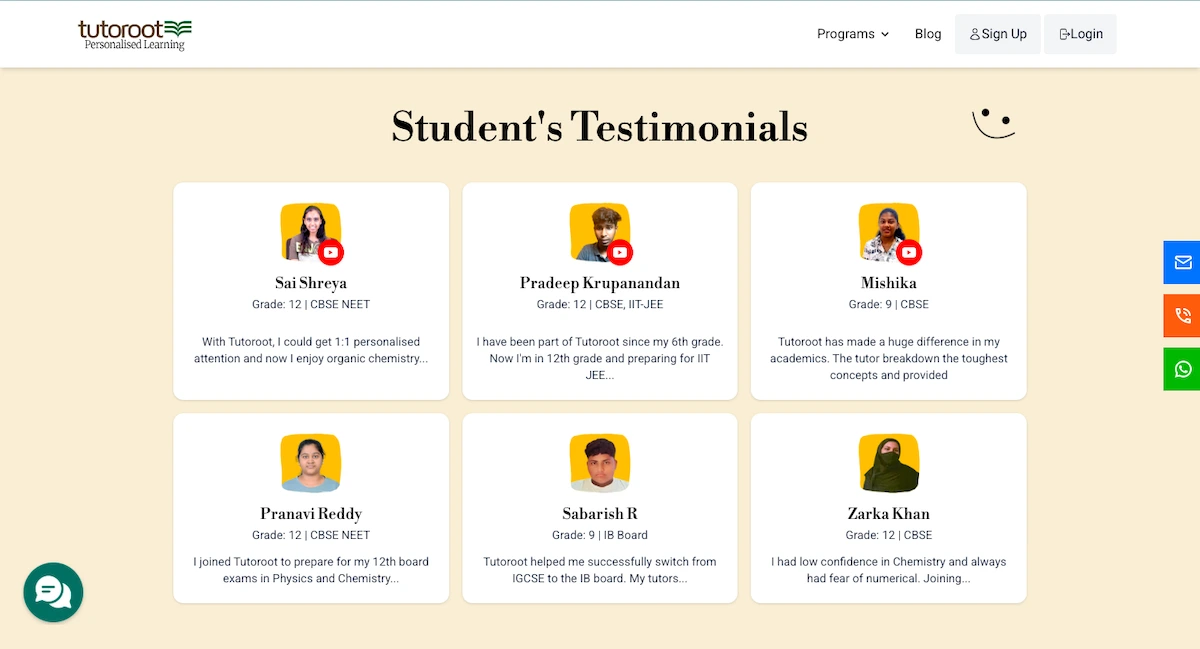
Is Tutoroot legit? Tutoroot clearly exists as an edtech business, with a website, social media, and reviews on platforms. The UrbanPro listing and Indeed profile show it is a real company. Mixed reviews suggest it is legitimate but has service issues: some users report real interactions with tutors (positive) while others report broken promises (negative). The mix of feedback indicates Tutoroot does operate, but customer experiences vary.
Summary: Tutoroot is an active tutoring service with many positive remarks about tutor expertise. However, multiple reviewers warn of scheduling and refund problems. In short, it delivers on its promises for some students, but has had notable complaints about missed classes and payments.
Tutoroot Pricing
Pricing Range
Tutoroot offers courses rather than per-hour tutoring. According to their information, single-subject packages start around ₹20,000 and can go up to ₹70,000 for multi-subject packages (about USD $250–$900). Fees vary by subject and course length. For example, their IIT-JEE or full-board CBSE package is at the higher end, while short revision courses cost less. One parent review noted Tutoroot has a “very reliable fee”, implying transparent pricing.
Courses are packaged by curriculum (e.g. CBSE, IGCSE, IB, JEE/NEET). Tutoroot does not list hourly rates like a marketplace; instead, students select a program (e.g. JEE course or full CBSE curriculum). The site mentions installation plans too. For current fee details, see Tutoroot’s official site or contact them (their website lists contacts for more info).
What Students Say about Pricing
We found little public feedback specifically on price. One UrbanPro reviewer implied satisfaction by calling the fee “reliable”. There were no major complaints about being overcharged, just general service complaints. For context, private tutors in the US often charge roughly $25–$80 per hour. Tutoroot’s packages (~$250–$900 total) cover many classes, so per-hour cost may be comparable to other premium tutors. Overall, students seem to accept the pricing as fair for the promised package (no user said it was overpriced).
Hidden Costs
Tutoroot’s publicly stated fees cover the courses, and we found no mention of extra registration or surprise charges. The FAQs do not list any hidden fees. However, reviewers did note issues with refunds: one parent explicitly said Tutoroot gave “no refund” after canceling classes. This suggests cancellation or refund policies may be strict. Other than that, we saw no reports of add-on fees or registration charges. It appears all costs are upfront per package.
How Tutoroot’s Pricing Works
Payment is done online. Tutoroot accepts various methods: net banking, UPI, credit/debit cards. They also offer monthly installment plans (EMI) for large packages. Students typically pay up front for a course or apply for EMI. There are no standard group discounts or coupons advertised. We saw no mention of special discounts for groups, students or veterans. The one student review mentioning fees said it was “fair”. Overall, the pricing process is straightforward: pick a course, pay via the site or call support for details.
Free Trial
Tutoroot advertises a free demo class for new students (no cost trial session). This allows students to experience the platform before committing. The website’s sign-up form includes a “Book Your FREE DEMO” button. Terms for the trial are not detailed, but it is offered to anyone who registers. (We did not find any tricky conditions mentioned publicly.)
Refund Policy
The Tutoroot website does not clearly publish a refund policy. The FAQs do not discuss refunds. In practice, reviews suggest refunds may not be honored. For instance, one reviewer complained no refund was given when classes didn’t occur. We found no evidence of a money-back guarantee or refund if dissatisfied. Customers have criticized this gap; multiple testimonials hint that Tutoroot kept paid fees even when promised tutoring was not delivered. Thus, while Tutoroot claims quality service, some users perceive its refund terms as unfavorable.
Tutoroot Alternatives
Students and parents often compare Tutoroot to other tutoring platforms. Some may seek alternatives for different pricing, subjects, or flexibility. Below are popular tutoring services to consider as alternatives. These range from broad marketplaces like Wyzant to specialized help like My Engineering Buddy (our own site). Each has its own pros and cons.
Wyzant

Wyzant is a US-based tutor marketplace. Pros: It has a huge tutor pool, and students pay by the lesson with no subscription. Tutors set their own rates (often $35–$60/hr). Wyzant offers a “love it or it’s free” first-lesson guarantee. Cons: It tends to be expensive, and quality varies since anyone can register as a tutor. In comparison, Tutoroot’s rates are fixed per course, and its teachers (allegedly IIT grads) are vetted. Wyzant covers many subjects (even beyond school level), while Tutoroot focuses on school curricula. Ease of use: Wyzant lets you search and message tutors directly; Tutoroot assigns a tutor after enrollment. Trustworthiness: Wyzant has reviews, but some students report it as just a broker. Wyzant’s flexible booking is a plus, but Tutoroot’s dedicated structure (fixed class schedules and parent support) is different.
My Engineering Buddy
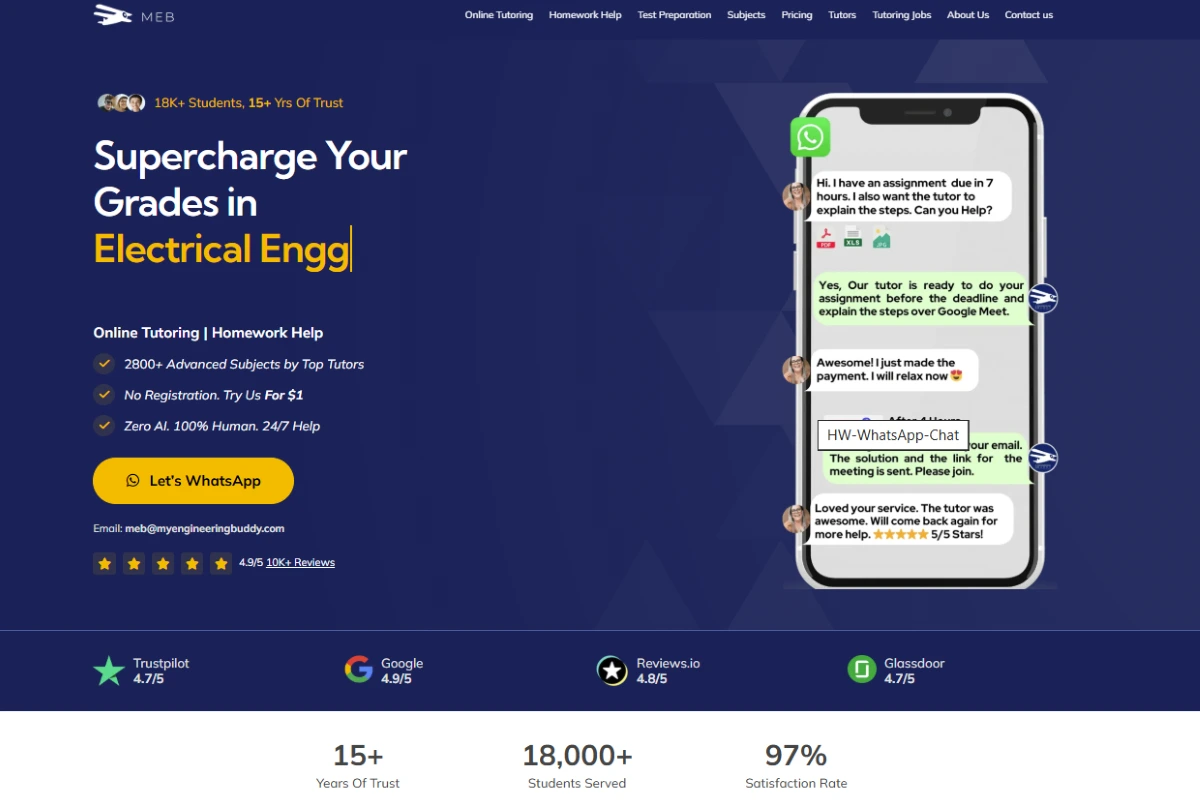
My Engineering Buddy (MEB) specializes in higher-level math, science, and engineering tutoring. Pros: Its tutors are subject experts for college courses (Mechanical, Civil, etc.). Many students praise MEB for making hard topics easy; for example, a high school student said MEB’s physics tutor “made tough problems easy to understand”. Pricing is pay-as-you-go and considered good value. MEB supports students globally (US, UK, Australia, Gulf). Cons: It may not cover school-board courses or K-12 exam prep, so it’s less useful if you need, say, CBSE or IB tutoring. Tutoroot’s global reach seems smaller (mostly Asia), while MEB is broad. In short, for complex engineering or college topics, MEB provides deeper expertise. For standard K-12 subjects, Tutoroot may suffice.
Chegg Tutors

Chegg offers online homework help and on-demand tutoring. Pros: Affordable monthly subscription gives 24/7 Q&A and live help. You can get step-by-step solutions any time. Cons: Tutors aren’t always live; it’s more for quick answers. There’s no long-term tutoring plan like Tutoroot’s courses. If you only need occasional homework help, Chegg is cheaper, but for structured exam prep, Tutoroot’s full courses might be better.
Varsity Tutors
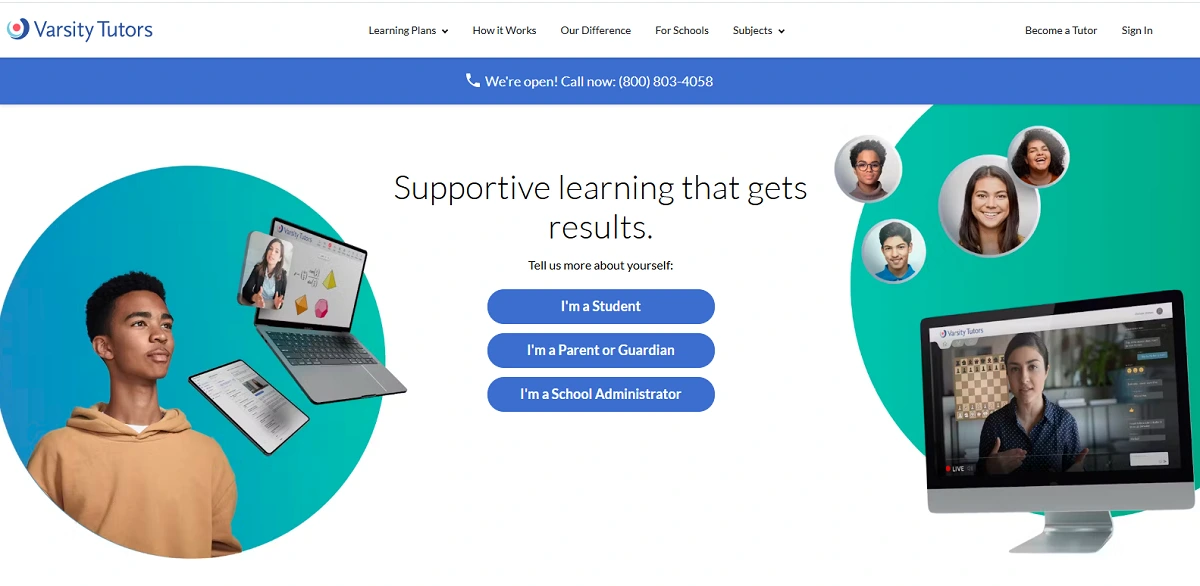
Varsity Tutors offers live tutoring for many subjects and test prep (SAT, GRE, etc.). Pros: Very large tutor network (~40,000 experts in 3000 subjects). Personalized learning plans and lots of scheduling options. Cons: It’s quite expensive (often $70–$95/hr for advanced subjects). Scheduling can require phone calls to a consultant. Compared to Tutoroot, Varsity covers more test prep (ACT, GRE) and has more tutors, but Tutoroot may be easier to start with (online signup) and cheaper since it uses fixed packages.
TutorMe

TutorMe is an on-demand tutoring service with AI-matching. Pros: Instant help any time, hundreds of subjects, and an interactive digital classroom. Cons: It charges per minute, which can add up. In contrast, Tutoroot’s fixed course packages may be better for students needing regular classes. TutorMe may be good for quick questions or homework help, while Tutoroot is a full tutoring program.
How Tutoroot Works
For Students
Students start by signing up on Tutoroot’s site or contacting them. The FAQs say you should select a board and grade, then pick a subject and demo class. After signup, Tutoroot assigns you to a tutor for your chosen course. Classes are fully online: students connect via live video, audio, and chat for interactive lessons. The schedule for each course is planned in advance. If a class is missed, a recorded video is provided, and a recap session each Sunday clears any doubts. Students pay the fee upfront or via EMI, and then attend the scheduled sessions with their tutor.

For Tutors
To become a tutor on Tutoroot, you must have strong qualifications (often an engineering degree or equivalent) and teaching ability. While the exact hiring steps are not public, typically one would apply on the website or contact Tutoroot with credentials. Selected tutors likely go through an interview or demo lesson to verify expertise. If accepted, a tutor creates a profile on the platform and is listed as part of Tutoroot’s faculty. Tutors do not set their own rates; Tutoroot’s courses have fixed fees. After joining, tutors prepare lessons according to Tutoroot’s curriculum and join the scheduled live classes. (See Tutoroot’s site for tutor application details)
FAQs
Can tutors set their own fees? No. Tutoroot offers fixed-price courses rather than a marketplace model. Tutors are paid by the company and do not choose the hourly rate. They focus on teaching the curriculum as part of the set courses.
How much can a tutor earn per hour? Public information is not available. Tutoroot pays its tutors a salary or stipend, not a direct hourly fee. Compared to market rates, it is likely modest (anecdotally, employees at Tutoroot report salaries below industry standards). No official rate has been disclosed.
How many tutoring hours can a tutor get per month? That varies. Tutors may teach anywhere from part-time to full-time based on demand for their subject and board. As courses run over months, a tutor’s schedule depends on the number of students enrolled. There is no guaranteed minimum hours per tutor; it depends on how many classes are booked.
Is it easy to get students on Tutoroot? We found no data. Tutoroot assigns students to tutors as needed. It’s not a self-service marketplace, so tutors likely rely on the company’s marketing. Generally, tutors with in-demand subjects may find more work. By contrast, on platforms like Varsity Tutors, some tutors say it can be hard to get regular assignments. We saw no specific reviews for Tutoroot tutors, so it likely varies.
Tips to get more students on Tutoroot: Although Tutoroot is not a tutor marketplace, good strategies would include offering multiple subjects, being flexible with scheduling, and providing high-quality teaching. Positive word-of-mouth is key. On other platforms, tutors recommend prompt communication and encouraging student feedback. In practice, consistently good teaching likely leads Tutoroot to retain or refer students, since Tutoroot claims nearly 100% student satisfaction in testimonials.
What tutors like about Tutoroot: Tutors at Tutoroot mention a productive work environment. An accounts executive review said “my day was good… management is good” and praised learning opportunities. Tutoroot’s focus on training and regular classes can be appealing. (No tutor testimonials were found from the platform itself.)
What tutors do not like: Some employee reviews point out negative aspects. For example, one video editor lamented “outdated methods, no provident fund, salaries stolen” at Tutoroot. In summary, employees have criticized the company’s management and pay practices. There were no publicly-posted complaints specifically from tutors about teaching tools or students.
Tutoroot: Company Information
Founding & Background: Tutoroot was founded in 2018 as an online tutoring startup. Its website and CEO’s LinkedIn indicate it began with a vision to provide one-on-one coaching by top graduates. It grew rapidly in recent years, adding many courses and staff.
Founders: The CEO is Paily Chiranjeevi (profile on LinkedIn), a former Bain associate and ex-CIO of another education company. He drives Tutoroot’s strategy and growth, as seen in his LinkedIn posts celebrating team expansion and revenue goals.
Mission & Vision: Tutoroot’s mission is to provide personalized, high-quality tutoring for school students. Its website stresses “personalized 1:1 online tuition” and expert mentors. It aims to use technology and expert teachers to help students excel (no separate “vision” statement found, but their focus is on educational excellence and student success). The founders emphasize innovation and continuous improvement.
Scale of Operation: Tutoroot is headquartered in Hyderabad, Telangana. It primarily serves students preparing for Indian and international school curricula. So far, it has taught over 1,000 students across 3+ countries. The company claims to employ a team of 100+ professionals (ex-IIT, IIM, PhDs), and “100+ teachers” delivered “1 Million hours” of lessons. Exact numbers of tutors versus office staff are not public. Tutoroot’s market is mostly in India and the Middle East, with some students abroad. Its site is in English and targets global boards like CBSE, IGCSE, IB, etc.
Types of Services: Tutoroot offers live online 1:1 tutoring classes (not group classes). It covers long-term courses (4–10 months) in academic subjects, competitive exam coaching (JEE/NEET), and foundation programs. Students also get recorded lectures, assignments, and mock tests as part of the service. It is not an on-demand homework site; everything is scheduled as part of a course. No essay-editing or AI homework help was found – it’s focused on live teaching and test prep.
Subjects Offered: Tutoroot’s main offerings are for grades 8–12. It covers Physics, Chemistry, Maths, Botany, Zoology, Computer Applications, Economics, English, Business Studies, Social Studies, and Accounts. It also runs programs for IIT-JEE, NEET, board exams (CBSE, ICSE, IB, IGCSE). In summary, it provides STEM and some commerce/humanities subjects aligned to school curricula and entrance exams.
Unique Features: Tutoroot highlights its 1:1 personalized teaching and expert faculty on the website. It advertises flexible scheduling and personalized study plans for each student. The platform includes regular parent-teacher meetings and weekly assessments for monitoring progress. They also offer dedicated doubt-clearing sessions every week and a free demo class. According to their site, these features promise high-quality, customized learning. (Reviews suggest the quality of tutors often meets expectations, though some promised features like refunds or quick scheduling have been questioned by users.)
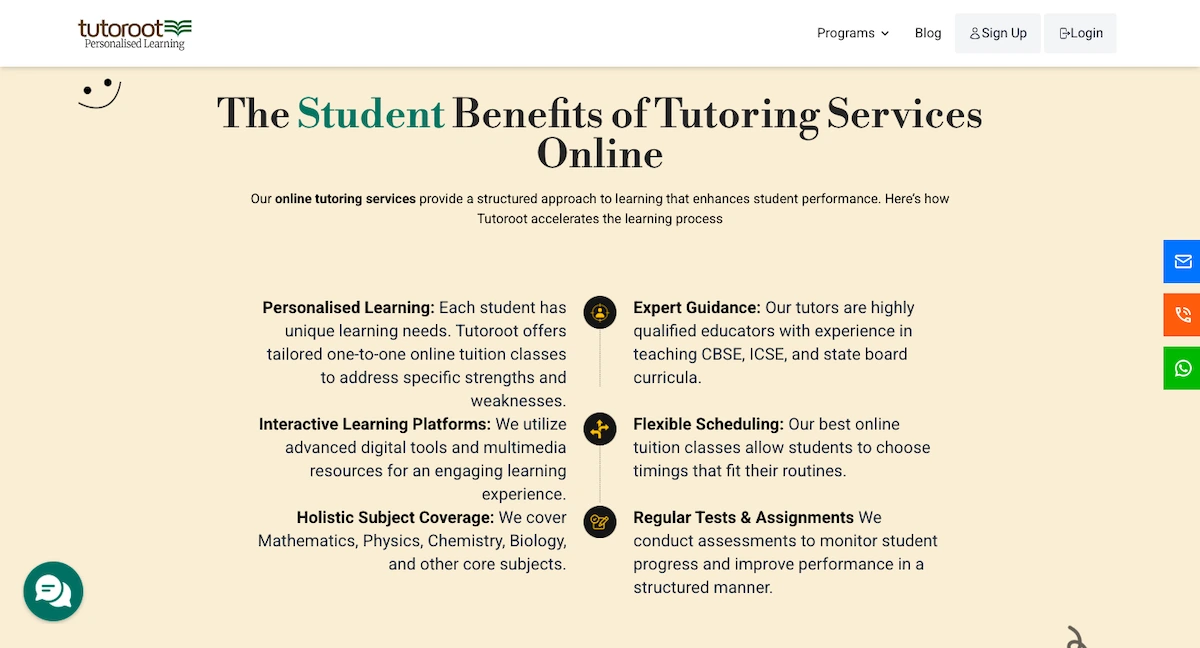
USP of Tutoroot
- One-on-One Tutoring: Tutoroot specializes in personalized 1:1 online classes, ensuring each student gets direct attention. This is a core promise (unlike group classes) and reviewers frequently mention positive one-on-one experiences.
- Expert Teachers: The company advertises top-tier tutors (IIT/NIT/Cambridge grads). Student reviews often note that tutors are experienced and clear in explanations, fulfilling this claim.
- Flexible, Tailored Plans: Tutoroot claims to provide flexible timing and personalized study plans. In theory, each student’s learning path is customized. This aligns with reviews that praise the tailored attention.
- Regular Monitoring: Tutoroot includes frequent assessments and parent-teacher meetings. The site emphasizes continuous monitoring of progress, though we found no independent confirmation from user reviews.
- Doubt-Clearing Sessions: Weekly recap sessions are built in. This is often highlighted as a benefit, and users appreciate being able to ask questions in extra sessions.
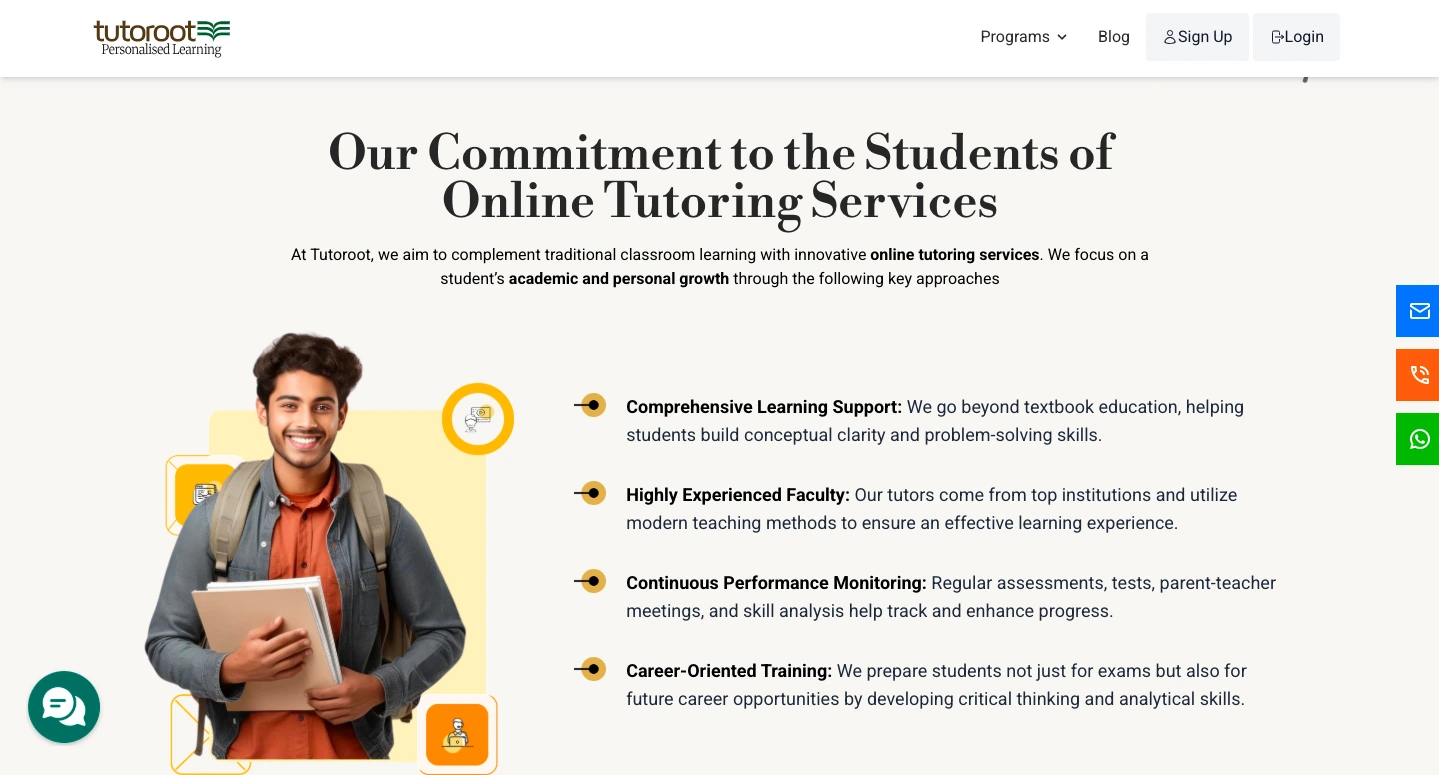
Drawbacks of Tutoroot
- Some students report serious service breakdowns, such as classes not starting and no refunds issued. This is a major trust issue noted in multiple reviews.
- A few reviewers describe poor communication and unmet promises, even calling the company “cheaters”. This suggests problems with management follow-through.
- Tutoroot’s focus is mostly on Grades 8–12 and certain exams. It does not cover college-level or non-school subjects, which limits its usefulness for some learners.
- The pricing model is all-upfront; if students drop out early they may lose money. (No public refund policy offsets this risk.)
Comparison with My Engineering Buddy
My Engineering Buddy (MEB) targets somewhat different needs. It excels at **advanced STEM help** for college courses. MEB’s tutors specialize in engineering and technical subjects, making it a strong choice for university-level or niche topics. Its pricing is pay-as-you-go and generally praised for value. In contrast, Tutoroot is designed for K–12 curricula and entrance exams. Both offer 1:1 tutoring and experienced staff, but MEB’s narrower focus means it has deeper expertise in those areas. For example, one student raved about a MEB physics tutor: “Ashish’s help … has been amazing. He makes tough problems easy to understand”. Another called the signup easy and recommended MEB’s help with thermodynamics. In summary, Tutoroot is suitable for school exam prep, while MEB stands out for complex engineering topics. Students needing advanced coursework often prefer MEB’s specialized support and strong satisfaction track record. Testimonials on MEB highlight excellent communication and outcomes, suggesting it may offer better help for tough college subjects. In contrast, Tutoroot’s strength is its structured K-12 programs.
Customer Support and Policies
Tutoroot provides standard contact support. The FAQs list phone and WhatsApp numbers and email addresses for help. We found no evidence of 24/7 live chat; support seems based on these channels. The company’s refund policy is unclear on the site. Based on reviews, refunds do not seem to be honored if classes are missed. By comparison, MEB highlights strong customer service: a recent MEB review notes their team “communicates clearly and offers excellent support”. Thus, while Tutoroot has basic support contacts, feedback suggests MEB may provide more responsive customer care in practice.
Global Reach and Localization
Tutoroot primarily serves students in India and nearby regions. Its materials cover CBSE, IB, IGCSE, etc., indicating an international curriculum focus, but the operation is mainly Asia-based (it reports students in “3+ countries”). The platform appears English-based only. My Engineering Buddy explicitly serves the US, UK, Canada, Australia, and Gulf countries. MEB also uses English and caters to those time zones (often with 24/7 availability). Tutoroot does not mention multilingual support. In terms of global accessibility, both platforms target international students in English, but MEB specifically markets to Western and Middle Eastern markets, whereas Tutoroot’s outreach seems more regional.
Tutoroot’s Future Plans
Tutoroot has not publicly announced specific upcoming products, but its leadership emphasizes growth. A recent company post notes they achieved a **15× annual revenue increase** (from ₹100M to ₹1,500M) and grew to 50 team members. The CEO says they are “looking forward… committed to innovation”. In blog posts, Tutoroot discusses AI and personalized learning, indicating awareness of technology trends. However, we found no concrete AI feature yet. It’s likely Tutoroot will expand online services (possibly analytics-driven study tools) and keep enhancing the platform. The emphasis on “leading edge” suggests continued investment in tech and possibly mobile apps. (For example, its marketing highlights AI-driven tools for engaging learning, hinting at future AI integration.)
FAQs About Tutoroot
How does Tutoroot compare to My Engineering Buddy? Tutoroot focuses on school-level and exam prep (grades 8–12 in boards like CBSE/IGCSE and exams like JEE), while My Engineering Buddy targets higher-level engineering and college subjects. Tutoroot offers structured courses and fixed pricing per course; MEB offers on-demand help and pay-as-you-go tutoring in specialized areas. MEB’s students often praise its expert tutors for difficult topics, whereas Tutoroot’s platform is built for broad curriculum coverage and long-term courses.
How are Tutoroot classes conducted? All Tutoroot classes are live online sessions where the student connects to a tutor via audio, video, and chat. They are interactive, one-on-one classes scheduled in advance. Each session is real-time, not pre-recorded (though recordings are provided later if missed).
What courses does Tutoroot cover? Tutoroot offers personalized tutoring for **Class 8–12 students** in curricula like CBSE, ICSE/ISC, IGCSE, and IB. It also provides coaching for competitive exams (e.g. JEE Advanced, NEET). The subject list includes Physics, Chemistry, Math, Biology (Botany/Zoology), Computer Applications, Economics, English, Business Studies, Social Studies, and Accounts. It does not offer courses beyond this scope (e.g. no college-level courses).
Does Tutoroot provide study materials or tests? Yes. Tutoroot supplies **comprehensive course materials and mock tests** aligned to the school syllabus. According to their FAQs, students get recorded lectures, assignments, and weekly assessments designed by experts. These resources are meant to reinforce what’s taught in the live classes.
What are the qualifications of Tutoroot’s tutors? Tutoroot states that all tutors are “subject matter experts” with strong track records in tutoring students for competitive exams. This implies they hire experienced teachers (often top-college graduates). Reviews support this: many users note tutors are knowledgeable and explain concepts well. However, actual qualifications vary by tutor.
Can fees be paid in installments? Yes. Tutoroot accepts multiple online payment methods (net banking, UPI, cards). They also offer EMI (installment) plans for course fees. Parents can request to pay the fee in monthly installments by contacting Tutoroot support.
What devices and internet speed are needed? Students need a computer or tablet and a headset/microphone to attend sessions. The system requirements (as listed in FAQs) include a standard laptop/desktop and an active internet connection (at least 2 Mbps up/down). A smartphone is not recommended for classes (desktop/laptop preferred).
How are students evaluated? Each week of classes concludes with an assessment. Tutoroot issues a performance report highlighting progress, and they alert parents if a student misses sessions. This ongoing evaluation is meant to track the student’s improvement over time.
Conclusion
Tutoroot’s strength is its personalized 1:1 tutoring by expert teachers, covering a wide range of school subjects. Its structured courses include live classes, regular tests, and doubt-clearing sessions. However, the mixed reviews point to weaknesses: some students experienced missed classes and no refunds. Overall, Tutoroot can be effective for dedicated exam preparation, but its inflexibility in refunds and issue handling are concerns. MyEngineeringBuddy is a strong alternative for advanced tutoring it boasts specialized tutors, high satisfaction, and positive testimonials for difficult subjects. For complex engineering or college-level help, MEB may be a better fit, while Tutoroot remains an option for structured K–12 tutoring needs.
******************************
This article provides general educational guidance only. It is NOT official exam policy, professional academic advice, or guaranteed results. Always verify information with your school, official exam boards (College Board, Cambridge, IB), or qualified professionals before making decisions. Read Full Policies & Disclaimer , Contact Us To Report An Error
